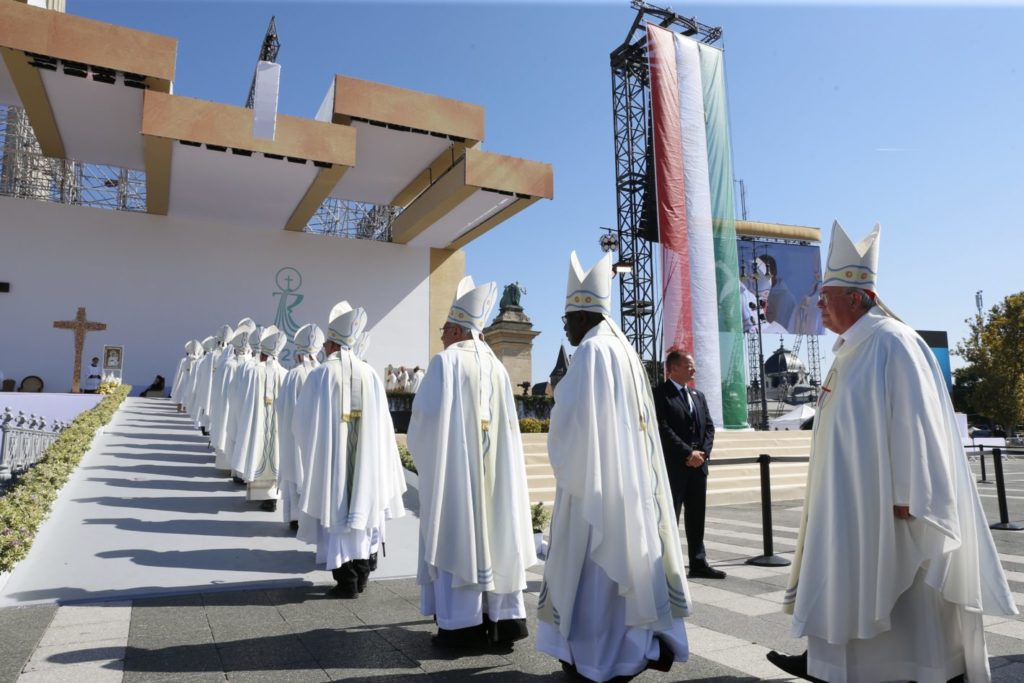As a result of the polarization in Hungary, one or the other political tendencies have tried to get hold of the Pope's message in Budapest on Sunday. For example, the opposition parties had distributed posters in Budapest with the Pope's messages, which they consider opposed to the policies of Prime Minister Orbán, and no one ignores that the electoral perspective also moves the government party. Also on the basis of other criteria, the media offered varied interpretations of the visit according to their own criteria or interests.
The real key to interpretation is to be sought in the Eucharist, which was the motive and theme of the visit. The Pope's invitation in his homily at the closing Mass of the International Eucharistic Congress was: "Let us allow the encounter with Jesus in the Eucharist to transform us, as it transformed the great and courageous saints whom you venerate, I am thinking of St. Stephen and St. Elizabeth. Like them, let us not be content with little, let us not resign ourselves to a faith that lives on rituals and repetitions, let us open ourselves to the scandalous novelty of God crucified and risen, Bread broken to give life to the world. Then we will live in joy; and we will bring joy".
The underlining was provided by the organization. Those present emphasized the care taken in the liturgical aspects, with a special reverence for the Eucharist. The ceremonies were well prepared and were celebrated in simple (Die Tagespost considered them "functional") but solemn settings, adjectives that can also be applied to the songs and vestments of the celebrants. In addition to the Mass with the Pope, the other highlight was the Eucharistic procession through the streets of the city, accompanied by thousands of people, including many young people. In addition, the recollection in the liturgical ceremonies was evident, especially in the moments of silence provided by the liturgy: "it was an overwhelming silence, even the babies were silent", said one of the participants.

A parish priest in Budapest, and not only him, appreciated the Pope's many details towards the Hungarian people, whom he addressed directly on several occasions, also in their complicated language ("thank you to the great Hungarian Christian family, which I wish to embrace in its rites, in its history, in the Catholic sisters and brothers and those of other confessions," he said while praying the Angelus). The editorial director, Andrea Tornielli, titled his article in L'Osservatore Romano: "Francis in the heart of the Hungarians".
If we add the large number and the level of commitment of the volunteers, from the organizational point of view the convocation has fulfilled its objectives well. And the program of the International Eucharistic Congress, also in the days preceding the Pope's brief stay in Hungary, has put it in a position to be, in the eyes of many observers, a new impetus for Catholics in the center of Europe, starting precisely from Eucharistic faith and devotion. The motto of the congress, taken from Psalm 87, invited us to look at it: "All my springs are in you". The catechesis, the working groups and the presence and testimonies of many people, including representatives of society and ordinary people, with a special emphasis on the Eucharist and the family, helped to make this possible.
Francis is now in Slovakia, on a pastoral visit that links naturally with the Budapest message. It is obvious that it will not be easy to estimate his real influence. In the meantime, the baton passes to the Archbishop of Quito, Ecuador, where the next Eucharistic Congress will be held in 2024. Cardinal Peter Erdö, who is largely responsible for the smooth running of things in Budapest, presented him with a miniature of the Mission Cross that has accompanied these days.






